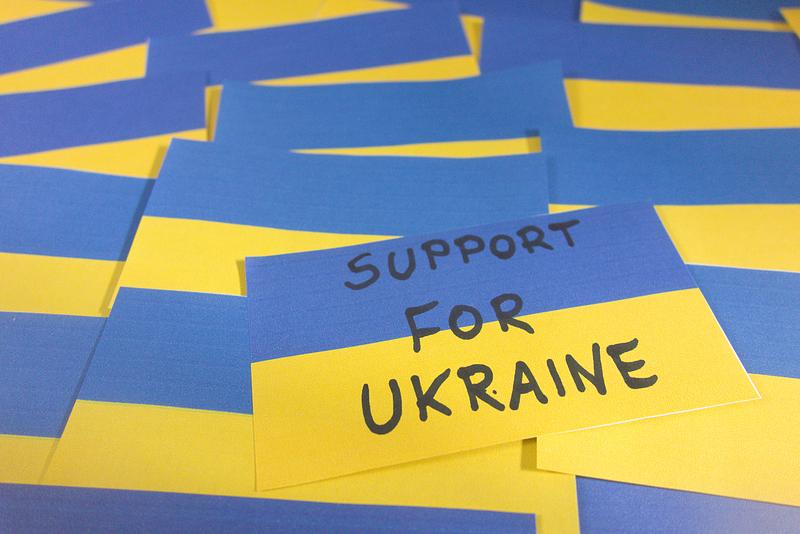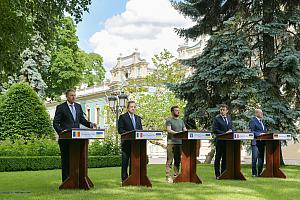Survey: 54% of Romanians support more economic assistance for Ukraine

A total of 54% of Romanians support providing more economic assistance to Ukraine, a pan-European survey commissioned by the think tank European Council on Foreign Relations (ECFR) found.
In Poland, another country surveyed that shares a land border with Ukraine, 71% of the respondents backed more economic assistance to their neighbor.
Sending additional arms to Ukraine is backed by 78% in Poland, against just 46% in Romania. The two countries differ most significantly on the idea of sending troops to Ukraine. Poles are among the few countries where support prevails over opposition to it (by 46% to 30%). Meanwhile, Romanians clearly oppose sending troops (by 44% to 26%), the survey found.
At the same time, 83% of those surveyed in Poland blame Russia for the conflict, compared to 58% in Romania, while 74% see Russia as the biggest obstacle to peace, compared to 42% in Romania.
The survey, carried out in Finland, France, Germany, Great Britain, Italy, Poland, Portugal, Romania, Spain, and Sweden, found that a majority of Europeans support Ukraine’s EU membership bid. Across the countries polled, 57% said they are in favor of Ukraine joining the EU, while 19% opposed such a move.
Poland is most in favor of Ukraine becoming an EU member, with 70% of the country’s respondents supporting Ukraine’s EU accession, followed by 69% in Portugal and Finland, and 66% in Sweden. A majority in Spain (58%) is also in favor.
The survey found that almost one-third (32%) of those polled in Germany, and just over a quarter of French (26%) and Italian (28%) respondents oppose Ukraine’s EU accession. However, the prevailing view in these three countries was still in support of Kyiv joining the bloc (48%, 47% and 46%, respectively).
Russia is universally blamed for starting the conflict and is also seen as the biggest obstacle to peace, according to the survey. Over 80% of respondents in Poland (83%), Sweden (83%), Finland (90%), and Great Britain (83%) hold Russia as the party responsible for this war – a view shared by strong majorities in Italy (56%), France (62%) and Germany (66%).
A comparable picture was also evident when the respondents were asked about the chief blockage to a potential peace agreement. In every country, a majority or plurality of citizens see Russia as the primary obstacle, with this viewpoint most evident in Finland (where 87% said this), Sweden (82%), Great Britain (76%), Poland (74%) and Spain (69%).
In Romania, 58% hold Russia responsible for the outbreak of the war in Ukraine, while 42% see it as the primary obstacle to a potential peace agreement.
The survey also identified a prevailing feeling that governments are too focused on the war, at the expense of other problems facing their own citizens. A total of 42% of respondents claimed their governments spend too much time on the war in Ukraine, while 36% were pleased with the amount of attention devoted to the conflict, and 4% said there was too little focus on the war. In Romania, 58% felt the government dedicated too much attention to the war, while 18% said the focus was about right.
The top concerns identified in regards to the war in Ukraine were the increasing cost of living and energy prices (61%) and the threat of nuclear weapon usage by Russia (61%). In Romania, 54% were concerned about the cost of living and higher energy prices, and 57% about the threat of nuclear weapon usage by Russia.
The results of the survey are available here.
The polls were carried out for ECFR through Datapraxis and YouGov in Finland, France, Germany, Great Britain, Italy, Poland, Portugal, Romania, Spain and Sweden. The survey was conducted between April 28th and May 11th, 2022, with an overall sample of 8,172 respondents. This was an online survey conducted in Finland (n = 500), France (n = 1,000), Germany (n = 1,000), Great Britain (n = 1,103), Italy (n = 1,009), Poland (n = 1,002), Portugal (n = 506), Romania (n = 501), Spain (n = 1,050) and Sweden (n = 501). The results are nationally representative of basic demographics and past votes in each country. The general margin of error is ±3 per cent for a sample of 1,000 and ±4 per cent for a sample of 500.
(Photo: Piotr Swat | Dreamstime.com)
simona@romania-insider.com













